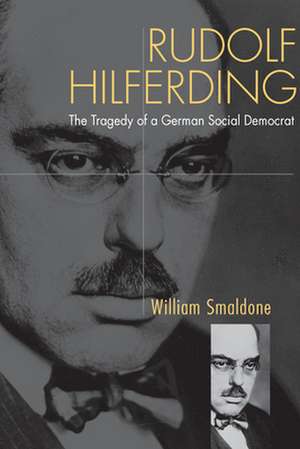Rudolf Hilferding: The Tragedy of a German Social Democrat
Autor William Smaldoneen Limba Engleză Paperback – 30 mar 2015
Until his death in a Gestapo prison cell, Rudolf Hilferding was one of Europe's most prominent socialist theorists and politicians. A leading economic thinker in the European socialist movement and an important politician in the German Social Democratic Party, he served as Weimar finance minister at the height of the inflation of 1923 and again at the onset of the depression in 1928. At a time when Germany faced one economic and political crisis after another, he led social democracy's efforts to strengthen the republic and to achieve its socialist objectives.
This finely crafted intellectual biography illustrates how Hilferding's personal and intellectual journey reflected the failures of social democracy in its confrontation with nazism and communism. After Hitler came to power in 1933, Hilferding in exile continued the struggle against the Nazis. Caught in the maelstrom of the French defeat, in 1940 he was arrested by Vichy authorities and treacherously handed over to the Gestapo.
Throughout his eventful life Hilferding analyzed the central issues facing modern socialism, including the development of finance capitalism, the nature of imperialism, the path to socialism, and the organization of socialist parties. For Hilferding, democratic freedom was at the heart of the socialist project, and in rejecting the tyranny of both communism and fascism, he made important contributions to the debate on the nature of totalitarianism. His insights into Marxist theory adn practice are still vital for understanding the development of socialism in the twentieth century.
This finely crafted intellectual biography illustrates how Hilferding's personal and intellectual journey reflected the failures of social democracy in its confrontation with nazism and communism. After Hitler came to power in 1933, Hilferding in exile continued the struggle against the Nazis. Caught in the maelstrom of the French defeat, in 1940 he was arrested by Vichy authorities and treacherously handed over to the Gestapo.
Throughout his eventful life Hilferding analyzed the central issues facing modern socialism, including the development of finance capitalism, the nature of imperialism, the path to socialism, and the organization of socialist parties. For Hilferding, democratic freedom was at the heart of the socialist project, and in rejecting the tyranny of both communism and fascism, he made important contributions to the debate on the nature of totalitarianism. His insights into Marxist theory adn practice are still vital for understanding the development of socialism in the twentieth century.
| Toate formatele și edițiile | Preț | Express |
|---|---|---|
| Paperback (1) | 246.99 lei 6-8 săpt. | |
| Northern Illinois University Press – 30 mar 2015 | 246.99 lei 6-8 săpt. | |
| Hardback (1) | 349.56 lei 6-8 săpt. | |
| Northern Illinois University Press – 31 mai 1998 | 349.56 lei 6-8 săpt. |
Preț: 246.99 lei
Nou
Puncte Express: 370
Preț estimativ în valută:
47.34€ • 49.69$ • 39.05£
47.34€ • 49.69$ • 39.05£
Carte tipărită la comandă
Livrare economică 23 ianuarie-06 februarie 25
Preluare comenzi: 021 569.72.76
Specificații
ISBN-13: 9780875807140
ISBN-10: 0875807143
Pagini: 285
Dimensiuni: 152 x 229 x 20 mm
Greutate: 0.39 kg
Editura: Northern Illinois University Press
Colecția Northern Illinois University Press
ISBN-10: 0875807143
Pagini: 285
Dimensiuni: 152 x 229 x 20 mm
Greutate: 0.39 kg
Editura: Northern Illinois University Press
Colecția Northern Illinois University Press
Recenzii
"Mature, sensitive, and analytically sophisticated.... An important study of a major but neglected figure in twentieth-century European history."—David E. Barclay, Kalmazoo College
"A well-written, well-organized, and interesting study of the life of an extremely important Social Democratic theorist and politician."—Donna Harsch, Carnegie Mellon University
"A well-written, well-organized, and interesting study of the life of an extremely important Social Democratic theorist and politician."—Donna Harsch, Carnegie Mellon University
Cuprins
Table of Contents
Introduction
1 The Austrian Heritage
2 Finance Capital and the Struggle for Unity
3 The Revolutionary
4 The Republican Theorist
5 The Republican Politician
6 The Sword of Damocles
Afterword
Notes
Bibliography
Index
1 The Austrian Heritage
2 Finance Capital and the Struggle for Unity
3 The Revolutionary
4 The Republican Theorist
5 The Republican Politician
6 The Sword of Damocles
Afterword
Notes
Bibliography
Index
Descriere
Until his death in a Gestapo prison cell, Rudolf Hilferding was one of Europe's most prominent socialist theorists and politicians. A leading economic thinker in the European socialist movement and an important politician in the German Social Democratic Party, he served as Weimar finance minister at the height of the inflation of 1923 and again at the onset of the depression in 1928. At a time when Germany faced one economic and political crisis after another, he led social democracy's efforts to strengthen the republic and to achieve its socialist objectives.
This finely crafted intellectual biography illustrates how Hilferding's personal and intellectual journey reflected the failures of social democracy in its confrontation with nazism and communism. After Hitler came to power in 1933, Hilferding in exile continued the struggle against the Nazis. Caught in the maelstrom of the French defeat, in 1940 he was arrested by Vichy authorities and treacherously handed over to the Gestapo.
Throughout his eventful life Hilferding analyzed the central issues facing modern socialism, including the development of finance capitalism, the nature of imperialism, the path to socialism, and the organization of socialist parties. For Hilferding, democratic freedom was at the heart of the socialist project, and in rejecting the tyranny of both communism and fascism, he made important contributions to the debate on the nature of totalitarianism. His insights into Marxist theory adn practice are still vital for understanding the development of socialism in the twentieth century.
This finely crafted intellectual biography illustrates how Hilferding's personal and intellectual journey reflected the failures of social democracy in its confrontation with nazism and communism. After Hitler came to power in 1933, Hilferding in exile continued the struggle against the Nazis. Caught in the maelstrom of the French defeat, in 1940 he was arrested by Vichy authorities and treacherously handed over to the Gestapo.
Throughout his eventful life Hilferding analyzed the central issues facing modern socialism, including the development of finance capitalism, the nature of imperialism, the path to socialism, and the organization of socialist parties. For Hilferding, democratic freedom was at the heart of the socialist project, and in rejecting the tyranny of both communism and fascism, he made important contributions to the debate on the nature of totalitarianism. His insights into Marxist theory adn practice are still vital for understanding the development of socialism in the twentieth century.











